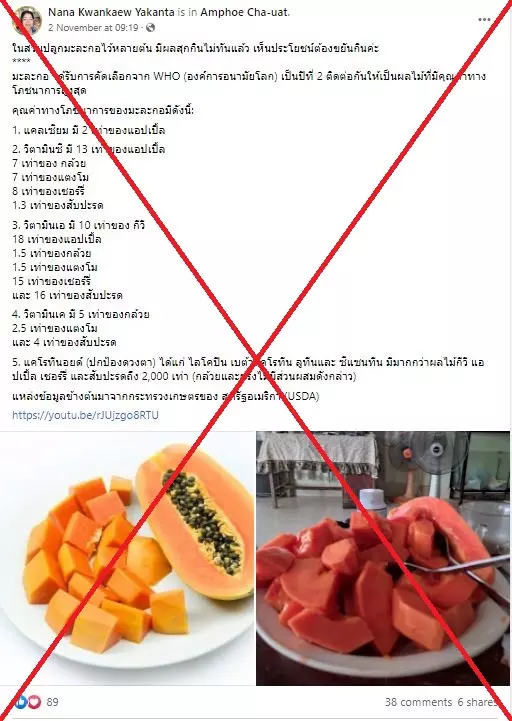Social media posts in Thailand claim the World Health Organization (WHO) selected papaya as "the most nutritious fruit" for the second year running. The claim is misleading; the WHO said that while it encouraged the consumption of fruit and vegetables, it did not recommended papaya in particular.
Also Read: CNN Interview Quotes Of Blackpink's Lisa Praising Thai Monarchy Are Fake
"Papaya has been selected by the WHO as the most nutritious fruit for two consecutive years," reads a Thai-language Facebook post published on November 2, 2021.
The post goes on to claim that papaya contains more nutrients than other fruits — including twice as much calcium as apples, 16 times more vitamin A than pineapples and five times more potassium than bananas — purportedly referencing data from the US Department of Agriculture (USDA).
The post links to a YouTube video from Thai public broadcaster PBS featuring a discussion about the exotic fruit, including its health benefits, origins and tips on selecting a good papaya.

Screenshot of the misleading post, taken on November 8, 2021 Similar posts were shared on Facebook here and here, and in this news article.
However, the claim is misleading.
Also Read: Tromethamine Added To Pfizer's COVID-19 Vaccine To Prolong Storage
The World Health Organization said that it did not recommend any fruit or vegetable in particular.
"WHO strongly encourages the consumption of fruit and vegetables to maintain a healthy and well-balanced diet, a healthy weight, and prevent obesity. [However]WHO has never recommended any fruit or vegetable in particular," a spokesperson from the WHO's Thailand Country Office told AFP on November 3.
Keyword searches for "papaya most nutritious fruit" and "nutritious fruit ranking" on the agency's website found no results.
'Inappropriate' comparison
Health experts said comparing the nutrients in papaya and in other fruits is misleading.
Tipruedee Kongsuwan, a nutritionist at Thailand's Bureau of Nutrition — which is run by the health ministry — said that the purported comparison mislead people to understand that papaya "is more nutritious than others".
While it is true that papaya has higher calcium than apples, neither fruit is a good source of calcium, she said. Instead, green vegetables, milk, fish and tofu are better sources of calcium.
"Every fruit has different vitamins and nutrients. I recommend eating different fruits in order to reap different health benefits from different kinds. For papaya, it is the source of vitamin C and A, including beta-carotene," Tipruedee told AFP on November 8.
Dr Kanitha Tananuwong, an assistant professor at Chulalongkorn's Department of Food Technology, also said the posts were misleading.
"It may be inappropriate to compare it like that because each fruit has different outstanding health values and nutrients," she told AFP on November 5.
Also Read: No, Covid-19 Booster Shots Do Not Increase Lymphoma, Autoimmune Risks
Tipruedee added that eating too much fruit can do more harm than good.
"When eating fruits, you have to think about the sugar content in it too," Tipruedee said. She said it was also important to eat vegetables, which also have a high content of fibres.
Nutritional data
Furthermore, the information given in the posts about the nutritional value of papaya compared to other fruits does not correspond with US Department of Agriculture data.
According to the department's FoodData Central tool, 100 grams of raw papaya contains 182 mg of potassium, while the same quantity of ripe or slightly ripe bananas provides 326 mg of potassium.
On the other hand, 100 grams of raw papaya contains 20 mg of calcium, while the same quantity of apples contains between four and seven mg of calcium, depending on the type of apple.
Also Read: US Does Not Have Robot Army To Shoot Those Who Refuse Covid-19 Vaccine
The WHO recommends eating at least 400 grams, or five portions, of fruit and vegetables per day.
(Except for the headline, this story has not been edited by BOOM staff and is published from a syndicated feed.)